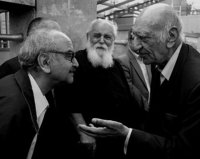Bastani Parizi

Bastani Parizi, Muhammad Ibrahim (b. 1925). He was born and received his primary education in Pariz, Kerman. His father, Hajj Shaykh ‘Ali Akbar, well-known as Hajj Akhund, was an erudite man, well-versed in religious teachings, a refined and witty poet and a freedom seeking patriot who made significant contributions to the education institutions. Hajj Akhund was appointed school principal by the Education Administration of the Kerman province from 1930 and his contributions include the construction of the school under his supervision. Bastini having completed his primary education and impeded from furthering his studies for a period of two years, he resumed his studies at the Kerman Teachers’ Training College in 1941 and obtained his diploma in 1946. He began studying history at the University of Tehran in 1947 and as reflected in his memoirs, he was one of the earliest of students residing at the student residence in North Amirabad, Tehran. He wrote a poem about his residence there whose opening couplet reads:
I am outspoken and happy with my assertiveness
I am the simple minded resident of Amirabad.
He graduated from the University of Tehran in 1951 and returned to Kerman to embark upon his teaching career. He married Habiba Ha’iri and remained in Kerman until 1958 when he obtained an admission to further his studies at Ph.D. level. He obtained his doctorate degree after defending his dissertation on Ibn Athir. His first employment at the University of Tehran in 1959 was as the editor of the Bulletin of the Faculty of Letters. Bastani served as a fulltime professor of that university until 2008 and was deeply involved in the affairs of the university. He was unexpectedly forced to retire along with 21 professors at the University of Tehran in August 2008.
He his intrest in writing began in his childhood by reading periodicals like the Habl al-Matin, the Ayandih, and the Mihr. During the two years (1939-1940) when he was impeded from receiving his formal education he published his early works in the Bastan newspaper and the Nida-yi Pariz journal, both published by him in Pariz, supported by two or three subscribers. His earliest contribution to the periodicals appearing at the time was an article entitled Taqsir ba Mardan Ast Na Zanan (Men are to blame rather than women) which was published in 1942 in the Bidari-yi Kirman journal. He has written or translated innumerable articles which have appeared in periodicals, like Kayhan, Ittila’at, Khandaniha, Yaghma, Rahnama-yi Kitab, Ayandih, Kilk, Pulad, Bamdad, Khawar, Alifba, Tihran Musawwar, Nakhuda, Shahrashub, Umid, Danistaniha, Taraqqi, Asiya-yi Jawan, Sipid u Siyah, Talash, Andishih, Wahid, Bastanshinasi, Barrasiha-yi Tarikhi, Bamshad, Nigin, Umid-i Iran, and Bukhara. His first book is Piyghambar-i Duzdan (The Thieves’ Prophet) which includes satirical epistles of Shaykh Muhammad Hasan Zaydabadi with annotations (1945). Sixteen editions of the work have appeared. His compositions and translations exceed 60. Some of his books include selections of articles originally published in periodicals and some others were originally written as independent books. The most well-known works of his include a series of seven books entitled Sab’a-yi Thamaniyya whose titles contain the word haft (seven), e.g. Khatun-i Haft Qal’a and Asiya-yi Haft Sang. Later, another book, Hashalhaf was added to the series. Bastani writes poetry as well, the earliest of which was composed in his childhood in the village of Pariz, in which he yearned for rain. A selection of his poetry, Yadbud-i Man, appeared in 1948. A ghazal included in the selection, opening with the hemistich: ‘I remember the night when the East wind sprinkled flower petals on us’, was performed on the vocals by Banan in memory of Saba. Contrary to history books generally written in a distant and difficult style, most of Bastani’s works are imbued with stories, anecdotes, proverbs, and pieces of poetry, making reading easier and more pleasant. He usually writes quite detailed footnotes, at times more detailed than the texts. His works include: Piyghambar-i Duzdan, the Farhang-i Kirman periodical; Rahnama-yi Athar-i Tarikhi-yi Kirman; the Haftwad Journal; Tarikh-i Kirman; Manabi’ wa Ma’akhidh-i Tarikh-i Kirman; Saljuqiyan wa Ghuz-ha dar Kirman; Farmandihan-i Kirman; Jughrafiya-yi Kirman; Jughrafi-yi Waziri; Ganj’ali Khan; Wadi-yi Haft Wad; Tarikh-i Shahi-yi Qarakhita’iyan; Tadhkira-yi Safawiyya-yi Kirman; Sahifat al-Irshad (Payan-i Safawiyya); Majmu’a-yi Hafti (Sab’a-yi Thamaniyya); Khatun-i Haft Qal’a; Asiya-yi Haft Sang; Na-yi Haft Band; Izhdaha-yi Haft Sar; Kuchih-yi Haft Pich; Zir-i In Haft Asiman; Sang-i Haft Qalam; Hashalhaf; Yadbud-i Man; Dhu ‘l-Qarnayn ya Kurush-i Kabir (translation); Yad u Yadbud (selection of poetry); Muhit-i Siyasi wa Zindigi-yi Mushir al-Dawla; Usul-i Hukumat-i Atin (translation of Aristotle’s work); Talash bara-yi Azadi (winner of UNESCO prize); Ya’ghub-i Layth (the Arabic translation of it appeared in Cairo); Shah-i Mansur; Siyasat wa Iqtisad-i ‘Asr-i Safawi; Akhbar-i Iran az Ibn-i Athir (translation of al-Kamil); Az Pariz ta Paris; Shahnamih Akharash Khush Ast; Hamasih-yi Kawir; Tan-i Adami Sharif Ast …; Nun-i Jaw wa Dugh-i Gaw; Farmanfarma-yi ‘Alam; Az Sir ta Piyaz; Mar dar Butkadih-yi Kuhnih; Kulah Gushih-yi Nushin Rawan; Huzuristan; Hazaristan; Mah u Khurshid u Falak; Sayih-ha-yi Kungirih; Bazigaran-i Kakh-i Sabz; Pir-i Sabzpushan; Aftabih-yi Zarrin-i Firishtigan; Nuh-i Hazar Tufan; Dar Shahr-i Niysawaran; Sham’i dar Tufan; Khud Mushtumali; Mahbub-i Siyah wa Tuti-yi Sabz; Darakht-i Jawahir; Guzar-i Zan az Gudar-i Tarikh; Kashih Kuzih-yi Tamaddun; Pust-i Palang; Hasiristan; Bargah-i Khaniqah dar Kawir-i Haft Kasih; Hawakhuri dar Bagh ba Guhar-i Shabchiragh.
Sukhan va Sukhanvaran-i Mu’asir (1/ 442-452); Farhang-i Sha’iran-i Zaban-i Parsi az Aghaz ta Imruz (1/ 79-81).
 In association with The Iran Heritage Foundation © All rights reserved 2024. Jane Lewisohn | Website by
In association with The Iran Heritage Foundation © All rights reserved 2024. Jane Lewisohn | Website by